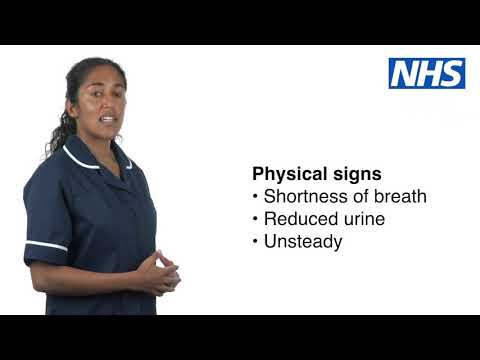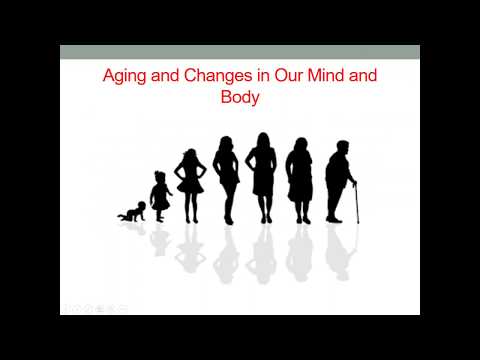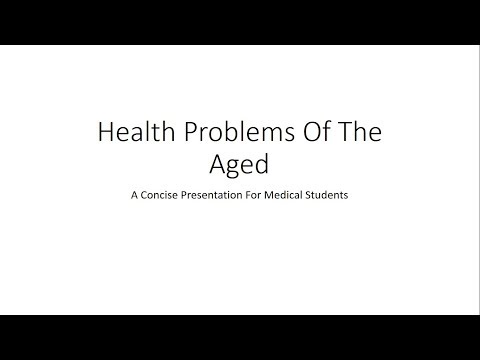Signs of Health Deterioration in the Elderly
Contents [show]
As we age, our bodies go through many changes. Some of these changes are normal, while others may be a sign of health deterioration. It’s important to be aware of the signs of health deterioration in the elderly so that you can seek medical help if necessary.
Checkout this video:
Signs and symptoms of health deterioration in the elderly.
The elderly population is susceptible to a number of age-related health problems These include, but are not limited to, heart disease, stroke, cancer, and memory decline. Many of these conditions can lead to a decline in overall health and wellness. It is important to be aware of the signs and symptoms of health deterioration in order to seek prompt medical attention when necessary.
Some common signs and symptoms of deteriorating health in the elderly include:
-Decreased appetite or sudden weight loss
-Increased fatigue or lethargy
-Changes in sleep patterns
-Decreased ability to perform activities of daily living
– Difficulty remembering recent events or conversations
– Confusion or disorientation
– Slurred speech or difficulty communicating
– Unexplained bruises or cuts
– Falls or accidents
What causes health deterioration in the elderly?
There are many different factors that can contribute to health deterioration in the elderly. These can include physical, psychological, and social factors.
Physical factors can include things such as chronic illnesses, frailty, and declining physical function. Psychological factors can include things such as depression and anxiety. Social factors can include things such as isolation and social support.
Many of these factors can interact with each other and cause a person’s health to decline. For example, a person who is isolated may begin to experience depression, which can then lead to declining physical health. It is important to address all of these factors in order to prevent health deterioration in the elderly.
How can you prevent health deterioration in the elderly?
As people age, they are more susceptible to health problems There are many things that can contribute to health deterioration in the elderly, including poor diet, lack of exercise, and social isolation.
There are several ways to prevent health deterioration in the elderly. One way is to make sure that they eat a healthy diet. Another way is to encourage them to get regular exercise. Finally, it is important to try to keep them from becoming socially isolated.
If you are concerned about an elderly loved one’s health, talk to their doctor. They can give you specific advice on how to prevent health deterioration in the elderly.
How to identify health deterioration in the elderly?
The elderly population is at a higher risk for health deterioration due to various factors such as age-related declines in physical and cognitive functions, chronic illnesses, and social isolation. Therefore, it is important to be able to identify the signs of health deterioration in order to provide timely and appropriate intervention.
There are many potential signs of health deterioration in the elderly, but some of the most common ones include:
-A sudden change in weight
-A sudden change in appetite
-A sudden change in sleep patterns
-A sudden change in mood or behavior
-A sudden decline in physical abilities
-A sudden decline in cognitive abilities
-Increased confusion or disorientation
-Increased falls or accidents
-Increased difficulty with self-care tasks
What are the consequences of health deterioration in the elderly?
Health deterioration is a major concern for the elderly population. The consequences of health deterioration can be significant, often leading to a decline in quality of life and an increased risk of mortality. In addition, health deterioration can also lead to an increased risk of falls, hospitalization, and nursing home placement.
How to treat health deterioration in the elderly?
As people age, they are more likely to experience health problems This is because the body’s systems start to break down and become less efficient. The most common health problems in older adults are:
-High blood pressure
-Arthritis
-Heart disease
-Cancer
-Stroke
– Diabetes
There are a number of ways to treat health deterioration in the elderly. Some of the most common methods are:
-Medication: This is often the first course of treatment for many health problems. Medication can be used to manage pain, lower blood pressure, and control diabetes.
-Exercise: Exercise is a great way to stay healthy and increase flexibility and strength. It can also help reduce the risk of falling.
-Surgery: In some cases, surgery may be necessary to correct a health problem. This is often the case with joint replacements or cancer treatments.
-Diet: Eating a healthy diet is important for all people, but it becomes even more important as we age. A healthy diet can help reduce the risk of developing health problems such as heart disease, stroke, and diabetes.
When to seek help for health deterioration in the elderly?
It can be difficult to know when to seek help for health deterioration in the elderly. They may be reluctant to see a doctor or may not have any obvious symptoms. However, there are some signs that you can look out for which may indicate that their health is deteriorating.
If you notice that your elderly relative is:
– Losing weight without trying
– Sleeping more than usual
– Feeling more tired than usual
– Experiencing difficulty swallowing
– Having more accidents or falls
– Showing signs of confusion or memory loss
– Showing changes in mood or behaviour
then it is worth speaking to their doctor to get their opinion. It could be that they just need a little more support, or it could be that they have a more serious health condition which needs treatment.
How to cope with health deterioration in the elderly?
Depression, anxiety, and social isolation are potential consequences of deterioration in health among the elderly. As we age, our bodies go through physical changes that can lead to a decline in health. This deterioration can be gradual or sudden, and it can have a major impact on our quality of life.
There are a number of ways to cope with health deterioration in the elderly. It is important to stay positive and to find ways to cope with the changes in your body. There are many resources available to help you make the most of your life despite the challenges of declining health.
What support is available for health deterioration in the elderly?
There are many different types of support available for health deterioration in the elderly. One type of support is home care home care can include help with activities of daily living, such as bathing, dressing, and eating. home care can also include providing transportation to doctor’s appointments and grocery shopping. Another type of support is adult day care. Adult day care provides a supervised setting for activities and socialization. Adult day care can also provide respite for caregivers. Finally, hospice care is a type of support that is available when a person is in the terminal phase of a disease and is no longer seeking curative treatment. Hospice care focuses on providing comfort and support to the person and their family.
FAQs about health deterioration in the elderly
1.What are some common signs of health deterioration in the elderly?
Some common signs of health deterioration in the elderly include weight loss decreased appetite, fatigue, and depression. If you notice any of these changes in your elderly loved one, it is important to talk to their doctor to rule out any underlying medical conditions.
2.What are some causes of health deterioration in the elderly?
There are many possible causes of health deterioration in the elderly, including chronic illnesses such as heart disease, cancer, and diabetes; medications; and lifestyle choices such as diet and exercise. It is important to work with your loved one’s doctor to determine the cause of their health decline so that you can develop a plan to improve their health.
3.What can be done to improve the health of an elderly person who is experiencing a decline?
If your loved one is experiencing a decline in their health, there are some steps you can take to help them improve. These steps include working with their doctor to develop a care plan, helping them make healthy lifestyle choices such as eating a nutritious diet and getting regular exercise, and providing emotional support.







